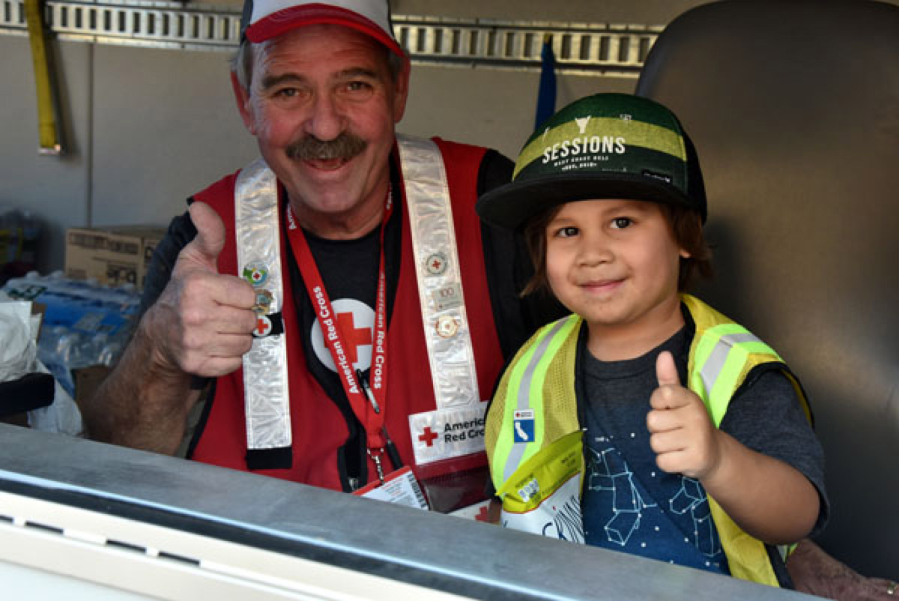Decades-long Vancouver resident Ron Burby used his emergency-response training, generally employed at local house fires, on a much larger scale in December when he was sent to the Thomas Fire in California.
Burby spent nearly three weeks in the area of the massive fire, working in the cities of Ventura and Santa Barbara helping run shelters.
“The fire zone itself was truly heart wrenching,” said Burby, who turned 65 while in California.
Burby moved to Vancouver in 1959, when the city’s population totaled 34,500. He’s seen the city’s size and density explode since spending his childhood days in the Fruit Valley area.
Now, he lives on a quiet street in Five Corners, but his work with the American Red Cross Cascades Region office takes him all around Clark County and beyond.
He described himself as similar to the character in the Clint Eastwood film “Gran Torino” — always on the lookout for trouble. But, he admits, the Walnut Grove neighborhood is pretty quiet.
Burby and his wife both became members of the Red Cross three months ago. Since then, they spend one week per month on call with the agency, ready to respond to scenes of house fires if residents are displaced.
During those weeks, the couple monitor PulsePoint, an app that keeps track of local scanner traffic. Their two-person “disaster action team” is requested all times of day and night. Burby’s vehicle has water, blankets, and other items fire victims may need immediately.
“We throw on our gear, grab what we need and head to the scene to give them aid and comfort,” Burby said.
“I feel obligated to help the local community,” he said.
Burning sounds, sights
Aid and comfort were sorely needed hundreds miles away in California in early December. Burby landed on Dec. 6, and around that time, officials there were predicting the then-96,000 acre Thomas Fire would continue for weeks.
Flying into Burbank, Burby witnessed the wildfire’s destruction from above.
“I was amazed by the tremendous amount of fire you could see from the plane and how big it was,” he said. “It was pretty chaotic. The train was just starting to pick up speed, so to speak.”
Burby spent most of his trip working at a shelter located on the Ventura County fairgrounds. According to Burby, it was crowded with about 200 evacuees. Smoke would inundate what he described as a repurposed agricultural building, but conditions improved when volunteers started setting up air purifiers.
On day five, Burby was assigned to an emergency response vehicle, or ERV, which was tasked with traveling out into closed-off neighborhoods and providing water, snacks and face masks to residents who decided to stick it out.
“They stayed there. They couldn’t get out and get back in, so they needed help,” Burby said.
As the days passed, the Thomas Fire spread, destroying homes and uprooting lives. Burby said the movement of the fire was wholly unpredictable. The blaze would destroy entire blocks of homes, but sometimes leave a single dwelling in the same stretch unharmed.
The sound of the fire was one of its characteristics that stuck out the most to Burby.
“You know a fireplace crackling? Multiple that by 1,000. And the flurries of embers. You would have thought it was the apocalypse.”
The Vancouver resident heard numerous stories during his time out in the neighborhoods; two stuck with him:
A Ventura man told Burby that he’d just bought his home and moved into the neighborhood around Thanksgiving. Unsure what to do about his new house when given the order to evacuate, the man decided to stay put with his young son. The man’s walls started smoldering, and he had no water on hand, so a neighbor, who happened to be a firefighter, pulled the sheetrock off the wall and doused its interior with a gallon of orange juice, according to Burby.
Burby also said he helped a man named Bob get his blood pressure medication. Bob was inside the evacuation zone; his wife was outside its perimeter. Burby coordinated with the couple to get the worried man his pills, he said.
“I was so touched by that experience,” he said.
Moody Mother Nature
On Dec. 23, Burby left to return Washington. His voice was raspy on the phone; being around the wildfire for so long had left him hoarse.
By then, the majority of the Thomas Fire had been contained, although it continues to burn, and the Red Cross was switching its focus toward recovery, Burby said. Service centers are working to guide victims toward mental health aid and financial assistance, he said.
All Red Cross overnight shelters are now closed, said Red Cross regional communications director Monique Dugaw. The two shelters Burby helped run — in Ventura and another at the University of California Santa Barbara — opened in the days before his arrival and closed on Dec. 25, Dugaw said.
“There were half a dozen more shelters that opened and closed at various times depending on needs of residents within the same time frame,” Dugaw noted in an email.
As of Dec. 27, Red Cross had provided 6,749 overnight shelter stays and served more than 63,300 meals and snacks during the Southern California wildfires, Dugaw said.
On Christmas Eve, the Thomas Fire became the largest wildfire on record in the state. It burned through 273,400 acres in Santa Barbara and Ventura counties. Officials said it was responsible for at least two deaths and destroyed more than 1,000 structures.
For Burby, the experienced made him feel blessed.
“It can happen to a lot of us at any time,” he said. “We’ve had fires in the (Columbia River) Gorge, so it can happen. Mother Nature has a mind of her own.”
He’ll keep volunteering locally and is ready for deployment elsewhere if he is needed, he said.
“I worked hard all my life, and when you’re working you’re a taker. I took as much as I could to get to where I am, and I reached the top. So my purpose in life now is to give back.”




